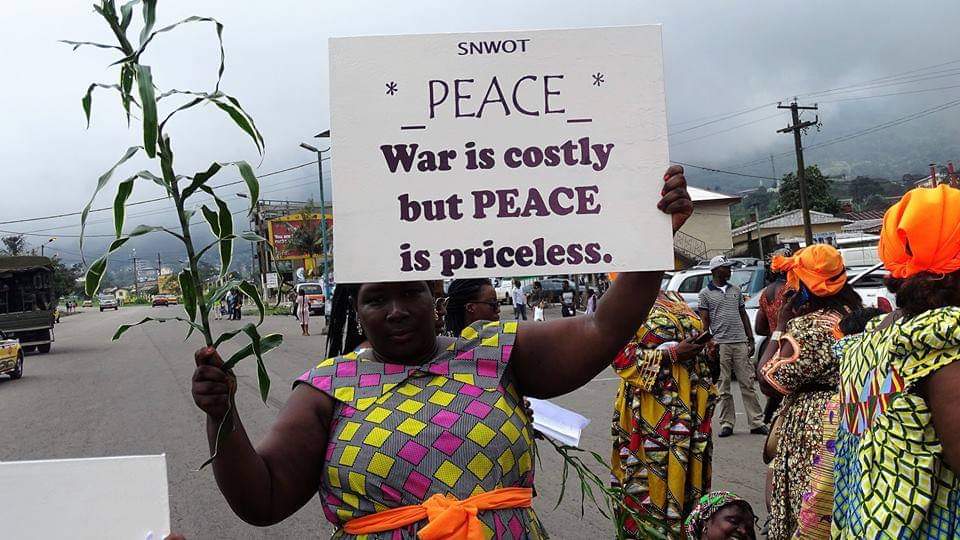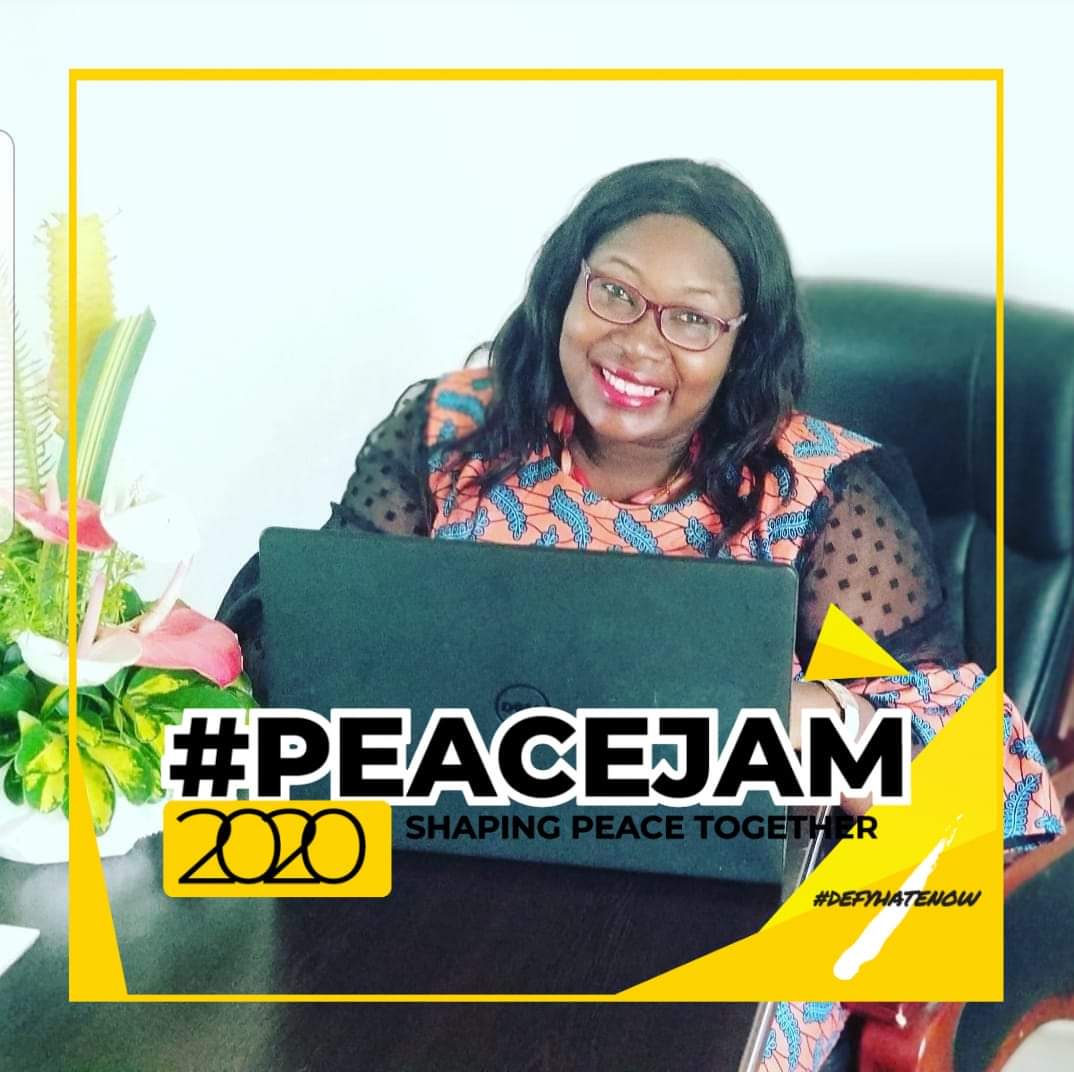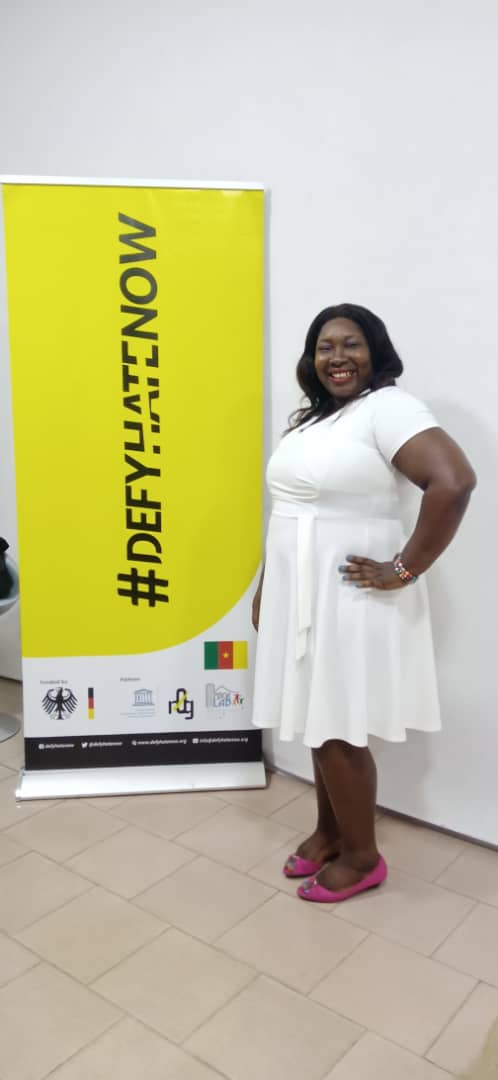
Human rights defender's story: Baiye Frida Ebai from Cameroon
'My goal in life is creating an environment in which every woman or girl can exercise her human rights and live to her full potential.' Baiye Frida Ebai, a passionate human rights advocate with over 14 years of experience promoting and protecting women and children's rights in vulnerable communities in Cameroon, shared her inspiring story with us.
Dear Frida, tell us about yourself and your organisation and how you decided to defend human rights!
I am Baiye Frida Ebai, a peacebuilder, humanitarian actor, human/frontline defender and communications specialist and the founder of Blessing Associates for Women and Children-BAWAC Cameroon which has as a mission to give a dignified life to all. My organisation focuses on health, education, economic empowerment schemes, gender-based violence (GBV) prevention measures, human rights and peacebuilding processes.
.jpg) My goal in life is creating an environment in which every woman or girl can exercise her human rights and live to her full potential. My experiences in building resilient communities and individuals, economic and social empowerment schemes, peacebuilding initiatives and developmental and mental health and psychosocial well-being all advancing the sustainable development goals are my driving force to work for humanity.
My goal in life is creating an environment in which every woman or girl can exercise her human rights and live to her full potential. My experiences in building resilient communities and individuals, economic and social empowerment schemes, peacebuilding initiatives and developmental and mental health and psychosocial well-being all advancing the sustainable development goals are my driving force to work for humanity.
2018 was the defining moment for me and many other women-led organisations in the South West and North West Regions of Cameroon who, while working on the humanitarian settings, witnessed first hand the untold suffering of communities bearing the brunt of the warring parties and deciding to come out as one to contribute significantly in ending the Anglophone crisis. That same year,we witnessed an increase in the internally displaced populations and refugees in neighboring Nigeria, the loss in livelihoods and the arbitrary arrests and detentions and so it was time to speak up and consistently call on both warring parties to engage in a genuine and sincere dialogue for peace processes to be effected by a third party.
How does defending rights affect your personal life?
I have been subjected to threats and attacks because of my work. Unfortunately, it comes with the territory due to the fact that the ongoing armed conflict in the South West and North West regions of Cameroon is not purely defined, as human rights defenders are not protected from harm and arbitrary arrests and kidnapping. I have experienced online harassment and reprisals because of my work which not only endangered my life but also that of my family and other women leaders in my line of work. This kind of exposure online and offline is very dangerous. In some instances, you are being labeled ‘black leg/traitor’ and calls are being made for you to be harmed. I have had my picture being put up on social media together with other women leaders and calls were being made on a live show on Facebook for us to be identified in our communities and different punishments assigned to us to inflict pain mentally and physically.
What could be done at the national / international level to help you work in safer conditions?
 Women human rights defenders need recognition and support from institutions, working together to create visibility and improve on their workforce so as to promote healthy communities, especially for marginalised persons and minorities – who have been given a dignified life and hope of a better tomorrow thanks to our work and significant contributions. Additionally, trauma healing, psychosocial support for frontline defenders and their families are very important. Retreating with other frontline defenders to share experiences on the field, and technical working groups to enhance their work and compare notes are very important too. Access to training programmes on cyber security for frontline defenders, especially women, is vital for all stakeholders contributing to prevent human rights abuses/violations in my part of the world.
Women human rights defenders need recognition and support from institutions, working together to create visibility and improve on their workforce so as to promote healthy communities, especially for marginalised persons and minorities – who have been given a dignified life and hope of a better tomorrow thanks to our work and significant contributions. Additionally, trauma healing, psychosocial support for frontline defenders and their families are very important. Retreating with other frontline defenders to share experiences on the field, and technical working groups to enhance their work and compare notes are very important too. Access to training programmes on cyber security for frontline defenders, especially women, is vital for all stakeholders contributing to prevent human rights abuses/violations in my part of the world.
How has the Covid-19 pandemic impacted your work?
Part of my work with survivors of GBV entails giving psychosocial first aid and emergency treatment especially for rape cases.With the shutdown of communities and health families during the early days of governments trying to ensure Covid-19 prevention activities, it was very hard on the survivors and case workers as we had very limited access to resources and transportation. To add, there is an increase in intimate partner violence due to the Covid-19 pandemic, as victims and their abusers were forced to stay in confined spaces with limited access to resources (financial and healthcare) or services to help them cope with their stressful experiences. The absence of safe spaces and shelter is greatly felt now because of the Covid-19 pandemic, as the very few safe houses/shelters we had for GBV survivors were closed and survivors had to bear the brunt of that decision thereby causing more damage to an already stressful situation and adding to my workload.
The year is 2050. How does the world look like and how did you contribute to this?
 I see a world where women, children and minorities live a dignified life in Cameroon because like-minded women (frontline defenders) like me contribute significantly to end gross human rights abuses and create safe spaces for women and children in vulnerable/conflict affected communities.
I see a world where women, children and minorities live a dignified life in Cameroon because like-minded women (frontline defenders) like me contribute significantly to end gross human rights abuses and create safe spaces for women and children in vulnerable/conflict affected communities.
The future of women and minorities in conflict zones is bright at this point in time because more women-led organisations focus more on solution-oriented and community-centered approaches in the implementation of the United Nations Security Council Resolution 1325 calling for Gender mainstreaming in relation to Peace.
For instance, contributing for children in the conflict affected Regions of Cameroon to go back to school – after the ban on schools – reduces the negative effects on these children and their communities.
Children’s rights to education is paramount no matter the reason and challenges on why the war is going on. All children have the right to go to school regardless of who they are,where they live.They deserve quality learning which requires a safe, friendly environment and motivated teachers, which was not the case. So together with other women-led organisations, we advocated online and offline for that ban to be off lifted by the separatist groups so that children could go back to school with a lot of positive strides despite the challenges.
My work in improving the health and rights of internally displaced persons is seen in the resilience of these host communities. By working to prevent GBV against women and children, ensuring sexual and reproductive health and rights and strengthening child survival and protection thereby empowering marginalised communities/individuals to live healthy lives.
Thank you, Baiye Frida!
Baiye Frida Ebai is the founder and executive director for Blessing Associates for Women and Children-BAWAC Cameroon. BAWAC-Camerooon is a young and dynamic organisation protecting women and children through human rights, youth development and entrepreneurship, prevention of gender-based violence, health, nutrition, as well as peace building, mediation and conflict resolution.
Photo credit: All the pictures are published with the kind permission of Baiye Frida Ebai
